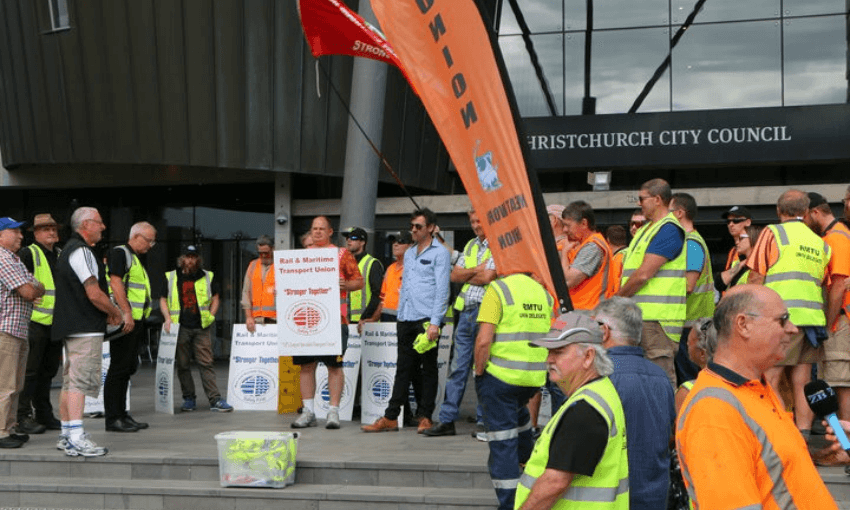New Zealand’s workers are underpaid and, increasingly, they aren’t willing to put up with it. Alex Braae looks at the recent surge in industrial disputes and strikes in New Zealand.
Nurses. Train and bus drivers. Port workers. Silver Fern Farms workers. Supermarket distribution workers. Fast food workers. Disability support workers. Fletcher Building workers. In the last year, all of these groups have either threatened to go on strike, or walked off the job altogether. Later this year, they may be joined by teachers.
It has long been acknowledged that New Zealand wages and salaries are low, relative to other OECD countries. And it appears that workers, particularly organised workers, have had enough.
Unionist Morgan Godfery said while he doesn’t believe there are more strikes than usual happening at the moment, “union members who are striking are being more assertive”. Nurses recently rejected a pay rise offer of 2%, plus a $1050 lump sum, in what is likely to be the most high profile industrial action of the year.
Nurses say they have two reasons to reject the offer,. They say they aren’t paid enough, and that hospitals are understaffed. It’s fair to assume better pay for a difficult job would in time solve the understaffing problem too. Freya Head, both a working nurse and a member of the union’s negotiating team, says this current dispute has been a decade in the making.
“We wanted to believe things were going to get better, and it just hasn’t. It’s not sustainable any more,” said Head. “What we do is very specialised. We need doctors, DHBs and the government to understand that, rather than getting young and inexperienced nurses in and having them burned out in five years.”
Freya Head also said the feeling towards collective action among nurses had dramatically shifted. She said it was an overwhelming vote against the deal, and more pertinently, union meetings now had high turnout. As she put it, “we’re all standing together. You can’t strike with 30% on board.”
Union membership in New Zealand is still slowly declining – at last count (2016) Statistics New Zealand had the share of employed labour force who are union members at 15.2%. But Unions Wellington coordinator Ben Peterson believes if groups like nurses are successful in using the threat of a strike to get a better deal, it could inspire others.
“Strikes being in the national discourse at the moment might actually drive them to happen. At the moment its been more talk than reality, but I think after decades of underfunding and wage stagnation, it could drive people to being open to taking action.”
Kim Campbell from the Employers and Manufacturers Association argues that strikes are a risk for unions, because while he says strikes have a rightful place, “you can annoy the public, and lose sympathy for your cause.”
Kim Campbell said the current industrial actions are “issue specific,” and are getting more strident after bubbling away for a few years. He says employers need to consider taking a more conciliatory approach to demands from workers.
“There’s one thing for sure. If workers, unionised or not, see record profits being made, and they don’t see their wages moving up, they get grumpy. It’s a natural dynamic that has always been there.”
“Our view as employer advocates, is that you don’t want to kill the goose that lays the golden egg. Even if you have a desire to pay more, but not the ability because you’re no longer competitive, it becomes a problem for everyone.”
The new government has made both moves and noises in favour of unions. Labour has resurrected a bill that would strengthen protections for Labour hire workers, they’re starting a programme of bumping up the minimum wage, have made changes to the 90 day trial law, and are looking to strengthen collective bargaining. Finance Minister Grant Robertson has also made non-committal expressions of support for nurses and teachers getting a pay rise, though earlier this week Jacinda Ardern refused to take an explicit position on whether nurses are underpaid.
Kim Campbell said his organisation wouldn’t advocate for those positions, but employers would simply have to accept some of them.
“We’re not going to sit there and say no to everything, but certainly we’re sounding a cautionary note on the whole lot together, because New Zealand could become uncompetitive again.”
Regardless, after many years of stagnant wages despite the so-called ‘rockstar economy,’ demands for a better share are likely to grow louder. And if well-organised groups manage to get big wins in their disputes, other workers might once again see unions as their best chance for success.
This section is made possible by Simplicity, New Zealand’s fastest growing KiwiSaver scheme. As a nonprofit, Simplicity only charges members what it costs to invest their money. It already has more than 12,500 plus members who, together, are saving more than $3.8 million annually in fees. This year, New Zealanders will pay more than $525 million in KiwiSaver fees. Why pay more than you need to? It takes two minutes to switch. Grab your IRD # and driver’s licence. It really is that simple.

